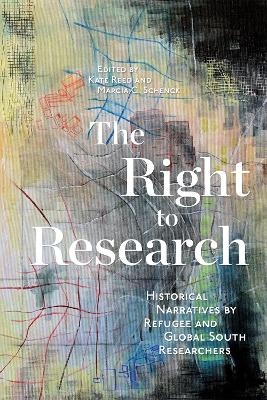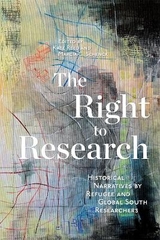The Right to Research
Historical Narratives by Refugee and Global South Researchers
Seiten
2023
McGill-Queen's University Press (Verlag)
978-0-2280-1455-3 (ISBN)
McGill-Queen's University Press (Verlag)
978-0-2280-1455-3 (ISBN)
Refugees and displaced people rarely figure as historical actors, and almost never as historical narrators and historians. The Right to Research offers a critical reflection on what history means, who narrates it, and what happens when those long excluded from authorship bring their knowledge and perspectives to bear.
Refugees and displaced people rarely figure as historical actors, and almost never as historical narrators. We often assume a person residing in a refugee camp, lacking funding, training, social networks, and other material resources that enable the research and writing of academic history, cannot be a historian because a historian cannot be a person residing in a refugee camp.
The Right to Research disrupts this tautology by featuring nine works by refugee and host-community researchers from across Africa, Europe, and the Middle East. Identifying the intrinsic challenges of making space for diverse voices within a research framework and infrastructure that is inherently unequal, this edited volume offers a critical reflection on what history means, who narrates it, and what happens when those long excluded from authorship bring their knowledge and perspectives to bear. Chapters address topics such as education in Kakuma Refugee Camp, the political power of hip-hop in Rwanda, women migrants to Yemen, and the development of photojournalism in Kurdistan.
Exploring what it means to become a researcher, The Right to Research understands historical scholarship as an ongoing conversation – one in which we all have a right to participate.
Refugees and displaced people rarely figure as historical actors, and almost never as historical narrators. We often assume a person residing in a refugee camp, lacking funding, training, social networks, and other material resources that enable the research and writing of academic history, cannot be a historian because a historian cannot be a person residing in a refugee camp.
The Right to Research disrupts this tautology by featuring nine works by refugee and host-community researchers from across Africa, Europe, and the Middle East. Identifying the intrinsic challenges of making space for diverse voices within a research framework and infrastructure that is inherently unequal, this edited volume offers a critical reflection on what history means, who narrates it, and what happens when those long excluded from authorship bring their knowledge and perspectives to bear. Chapters address topics such as education in Kakuma Refugee Camp, the political power of hip-hop in Rwanda, women migrants to Yemen, and the development of photojournalism in Kurdistan.
Exploring what it means to become a researcher, The Right to Research understands historical scholarship as an ongoing conversation – one in which we all have a right to participate.
Kate Reed is a PhD student in history at the University of Chicago. Marcia C. Schenck is professor of global history at the University of Potsdam.
| Erscheinungsdatum | 29.12.2022 |
|---|---|
| Reihe/Serie | McGill-Queen's Refugee and Forced Migration Studies |
| Zusatzinfo | 22 photos |
| Verlagsort | Montreal |
| Sprache | englisch |
| Maße | 152 x 229 mm |
| Themenwelt | Geschichte ► Allgemeine Geschichte ► Zeitgeschichte |
| Geschichte ► Teilgebiete der Geschichte ► Kulturgeschichte | |
| Sozialwissenschaften ► Politik / Verwaltung | |
| Sozialwissenschaften ► Soziologie | |
| ISBN-10 | 0-2280-1455-7 / 0228014557 |
| ISBN-13 | 978-0-2280-1455-3 / 9780228014553 |
| Zustand | Neuware |
| Haben Sie eine Frage zum Produkt? |
Mehr entdecken
aus dem Bereich
aus dem Bereich
Gewalt, Umwelt, Identität, Methode
Buch | Softcover (2024)
Spector Books OHG (Verlag)
36,00 €
wie Freud im Kollektiv verschwand
Buch | Hardcover (2024)
Klett-Cotta (Verlag)
25,00 €




